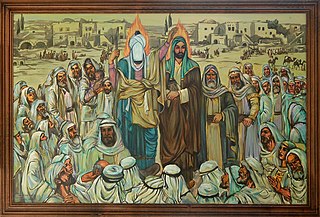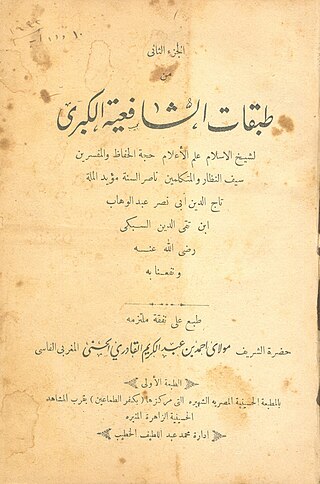
Nahj al-balāgha is the best-known collection of sermons, letters, and sayings attributed to Ali ibn Abi Talib, the fourth Rashidun caliph, the first Shia imam, and the cousin and son-in-law of the Islamic prophet Muhammad. The compilation of the book is often credited to Sharif al-Radi, a prominent Shia scholar. Known for its moral aphorisms and eloquent content, Nahj al-balagha is widely studied in the Islamic world and has considerably influenced the Arabic literature and rhetoric. In view of its sometimes sensitive content, the authenticity of the book has long been a subject of polemic debates, though recent academic research suggests that most of its contents can indeed be attributed to Ali by tracking the texts in sources that predate al-Radi.

Rajab is the seventh month of the Islamic calendar. The lexical definition of the classical Arabic verb rajaba is "to respect", which could also mean "be awe or be in fear", of which Rajab is a derivative.

The Bahrain Centre for Human Rights was a Bahraini non-profit non-governmental organisation which works to promote human rights in Bahrain, which was founded by a number of Bahraini activists in June 2002. The centre was given a dissolution order after its former president Abdulhadi Al Khawaja was arrested in September 2004 a day after criticizing the country's Prime Minister, Khalifah ibn Sulman Al Khalifah at a seminar in which he blamed the Prime Minister for the failure of widespread economic development for all citizens. The BCHR is still banned by the government, but has remained very active.

The Ghadīr Khumm was a gathering of Muslims to attend a sermon delivered by the Islamic prophet Muhammad on 16 March 632 CE. The gathering is said to have taken place by the ghadir (pool) in the wadi of Khumm, located near the then settlement of al-Juhfa on the path between Mecca and Medina, where Muhammad halted the large caravan of Muslims who had accompanied him in the Farewell Pilgrimage, his only Hajj ritual.

From 613 to 619 CE, the Islamic prophet Muhammad gathered in his hometown of Mecca a small following of those who embraced his message of Islam and thus became Muslims. The first person who professed Islam was his wife, Khadija bint Khuwaylid. The identity of the second male Muslim, after Muhammad himself, is nevertheless disputed largely along sectarian lines, as Shia and some Sunni sources identify him as the first Shia imam Ali ibn Abi Talib, a child at the time, who grew up in the household of his uncle, Muhammad. Other sources report that the first male convert was Abu Bakr, who later succeeded Muhammad as the first Sunni caliph, or Muhammad's foster son, Zayd ibn Haritha. While it is difficult to establish the chronological order of early conversions, the identities of early Muslims is known with some certainty.
Akhbar Al Khaleej is a Bahraini daily publication. It is the sister paper of the English-language daily, Gulf Daily News.
Saʽid Qomi was an Iranian Shia philosopher closely associated with the Qom School. Born in 1639, Qazi completed his early education in Qom and later served as a judge in the region, earning the title Qazi Said. His father, a scholar, imparted knowledge in medicine and philosophy to him. Notably, Qazi criticized the theory of substantial motion, often attributed to Mulla Sadra.

The Al-Abbas Shrine is the mausoleum of Abbas ibn Ali and a mosque, located near the Imam Husayn Mosque in Karbala, Iraq. Abbas was son of Ali ibn Abi Talib and the half-brother of Imam Hasan and Imam Husayn. He was Husayn's flag-bearer in the Battle of Karbala and chief of his caravans. The shrine is revered by the Shia Muslims who visit it every year, especially in the month of Muharram.

Abū al-Farash ʿAbd al-Raḥmān ibn ʿAlī ibn Muḥammad ibn al-Jawzī, often referred to as Ibn al-Jawzī for short, was a Muslim jurisconsult, preacher, orator, heresiographer, traditionist, historian, judge, hagiographer, and philologist who played an instrumental role in propagating the Hanbali school of orthodox Sunni jurisprudence in his native Baghdad during the twelfth-century. During "a life of great intellectual, religious and political activity," Ibn al-Jawzi came to be widely admired by his fellow Hanbalis for the tireless role he played in ensuring that that particular school – historically, the smallest of the four principal Sunni schools of law – enjoy the same level of "prestige" often bestowed by rulers on the Maliki, Shafi'i, and Hanafi rites.

Tabaqat is a genre of Islamic biographical literature that is organized according to the century in which the notable individuals lived. Each century or generation is known as a ṭabaqah, the plural of which is ṭabaqāt. The ṭabaqāt writings depict the past of a particular tradition of religious affiliation or scholarship and follows a chronological parameter that stretch from an authoritative starting-point to the generation (ṭabaqah) immediately preceding the assumed author.
The Khalafiyya Shia were a subsect of the Zaidi branch of Shia Islam.
Rajab is a masculine Arabic given name corresponding to the seventh month of the Islamic calendar which is known as Rajab, it is transcribed as Recep in Turkish, and Ragab from Egyptian Arabic, and Rexhep in Albanian.

Ibn Ḥajar al-ʿAsqalānī (Arabic: ابن حجر العسقلاني; 18 February 1372 – 2 February 1449 CE / 773 – 852 A.H.), or simply Ibn Ḥajar, was a classic Islamic scholar "whose life work constitutes the final summation of the science of hadith." He authored some 150 works on hadith, history, biography, exegesis, poetry, and Shafi'i jurisprudence, the most valued of which being his commentary of Sahih al-Bukhari, titled Fath al-Bari. He is known by the honorific epithets Hafiz al-Asr, Shaykh al-Islam, and Amir al-Mu'minin fi al-Hadith.

Nabeel Ahmed Abdulrasool Rajab is a Bahraini human rights activist and opposition figure. He is the president of the Bahrain Centre for Human Rights (BCHR), a member of the Advisory Committee of Human Rights Watch's Middle East Division, deputy secretary general for the International Federation for Human Rights (FIDH), member of the Advisory Board of the Bahrain Rehabilitation and Anti-Violence Organization (BRAVO), co-founder of the Gulf Centre for Human Rights (GCHR), and former chairman of CARAM Asia.
The Bahrain National Dialogue was an initiative instigated by King Hamad bin Isa Al Khalifa to promote reform and encourage discussion on the governance of Bahrain. The Dialogue began on 2 July 2011 and participants from over 300 organisations from across the Bahraini political spectrum were able to voice their concerns and thoughts freely and without being subject to conditions. The Dialogue was chaired by Parliament Speaker Khalifa bin Ahmed Al Dhahrani.
The following is a timeline of events that followed the Bahraini uprising of 2011 from April to June 2011. This phase included continued crackdown, lifting of the state of emergency and return of large protests.
The following is an incomplete timeline of events that followed the Bahraini uprising of 2011 from January to August 2012. This phase saw the first anniversary protest of the Bahraini uprising, the largest demonstrations in the history, and the escalation of violent clashes between youths and security forces.

The Islamic month of Muharram is a period of mourning in Shia Islam and commemorates the death of Imam Hussain, the third Imam, and his companions at the Battle of Karbala in 680 AD. Processions called Azadari are held to commemorate and remember the events that took place, these are often organised by congregation halls known as Hussainia. Mourning climaxes on the tenth day of Muharram, Ashura. The mourning is sometimes referred to as the Remembrance of Muharram.

Sahifah of al-Ridha, also known as Sahifat of al-Reza and Sahifatal-Imam al-Ridha, is a collection of 240 hadiths attributed to Ali ibn Musa al-Ridha, the eighth Shia Imam.

Eid al-Ghadir is an Islamic commemorative holiday, and is considered to be among the significant holidays of Shi'ite Muslims. The Eid is held on 18 Dhul-Hijjah at the time when the Islamic prophet Muhammad was said to have appointed Ali ibn Abi Talib as his successor. According to Shia hadiths, this Eid has been named "Eid-e Bozorg-e Elāhi", "Eid Ahl al-Bayt Muhammad" and Ashraf al-A'yaad.












